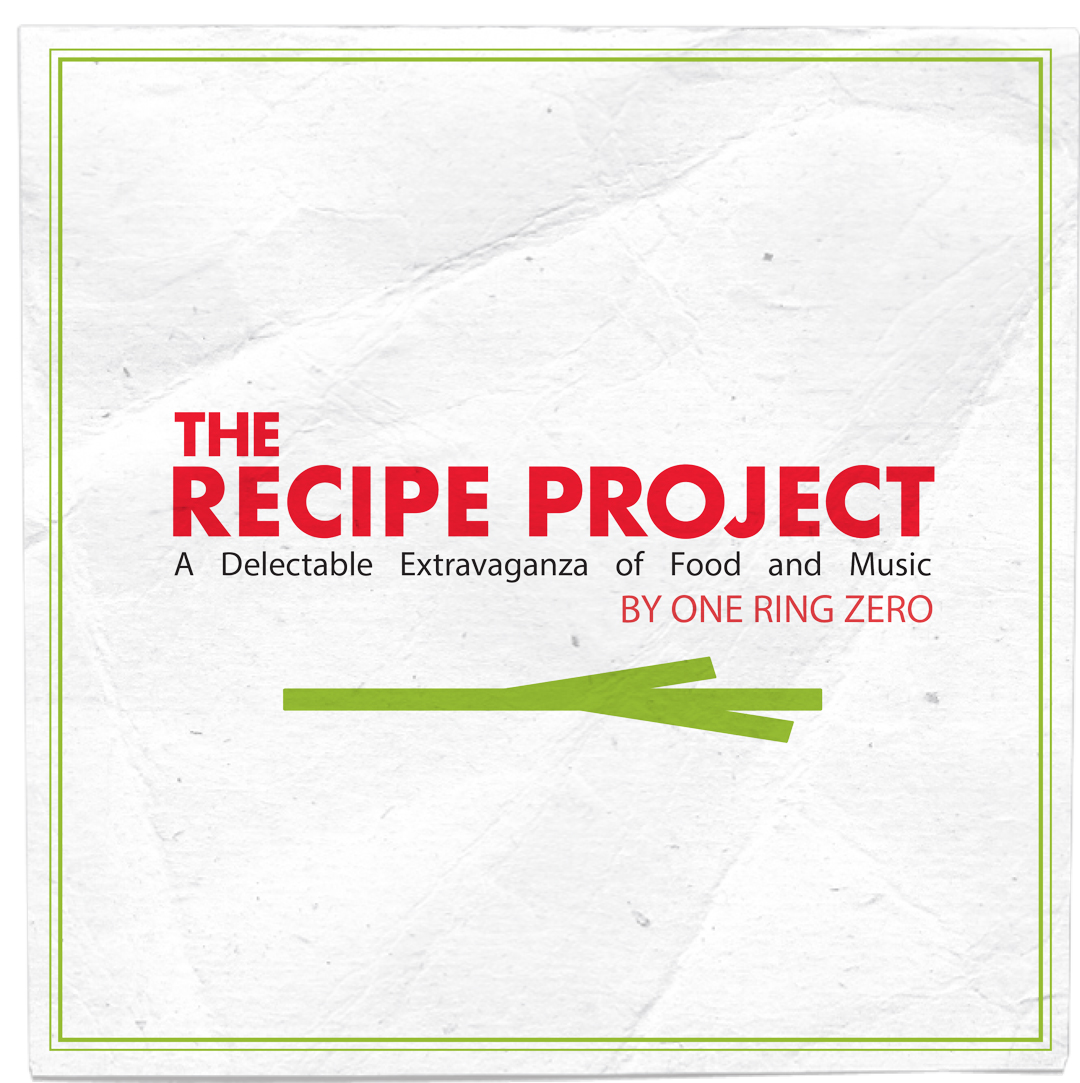
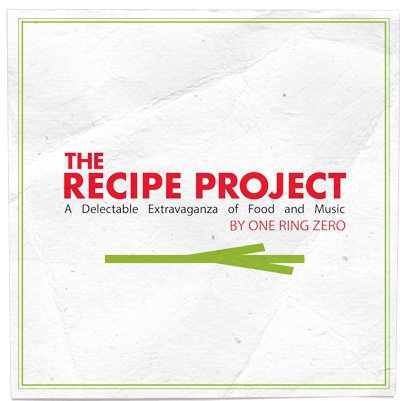
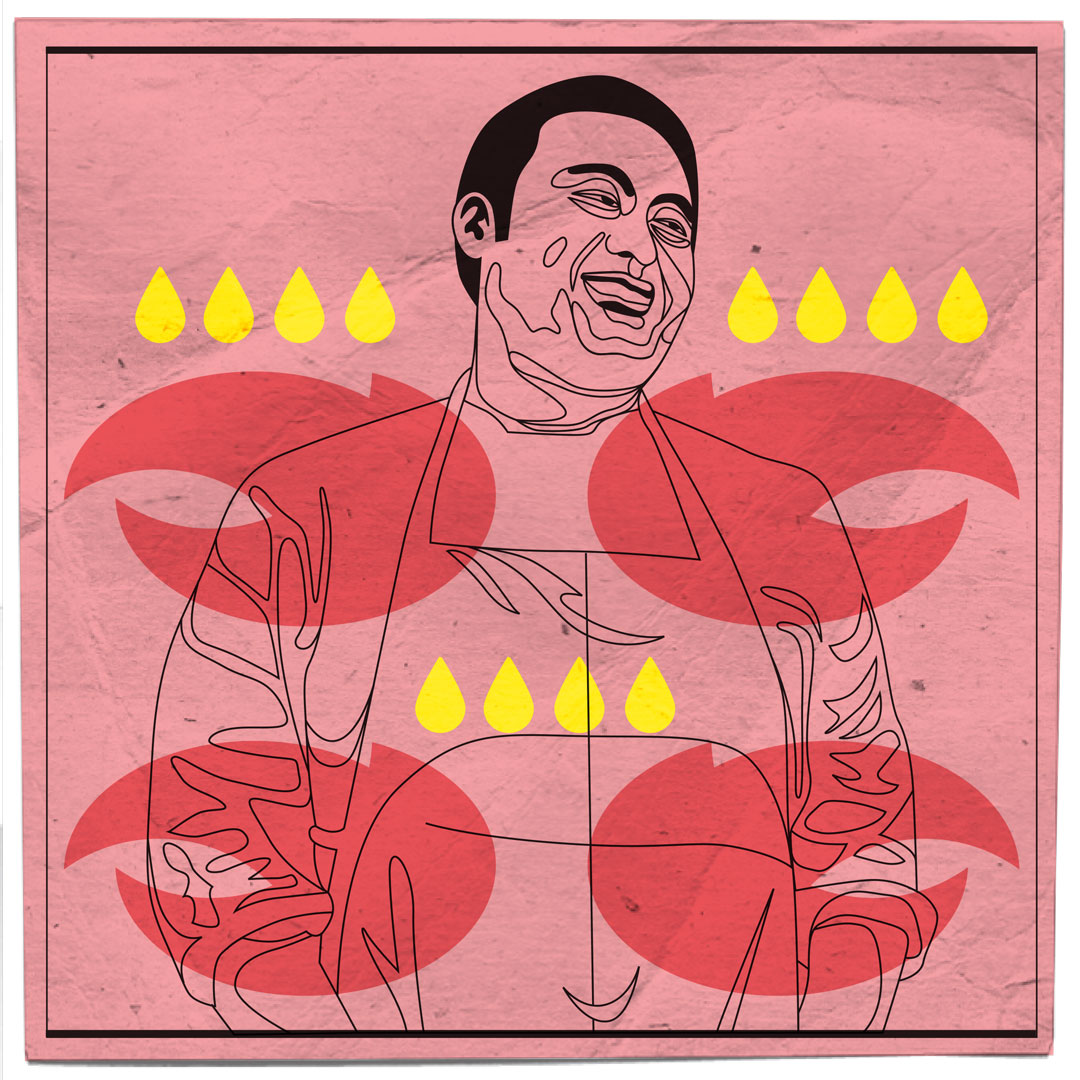
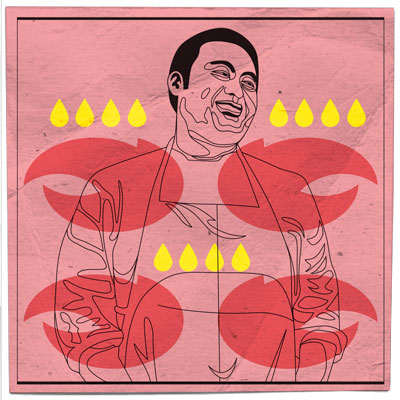
TRP: Let’s say you weren’t a famous chef—how many months of your life could you lose to music?
DC: I have almost 2 years worth of continuous music on my computer. A lot of it comes from the restaurant—managers from bands come in and they’re like, “Oh you’re playing the band I represent!” and slide me some CDs. So my collection is a massive weird mix of stuff.
TRP: And you make your own playlists, right? How’d you come up with the bizarre mix of Nina Simone and Smokey Robinson for Má Pêche, your newest place in midtown Manhattan?
DC: We started playing music for cooks, not the customers! At Noodle Bar, we used to blast it just to keep awake. Really loud music is great to cook to, but it’s weird because customers notice it, and pay more attention to the music than the food.
TRP: What type of music do you find most compatible with eating?
DC: Non-pop. You can play Yo La Tengo and 99 percent of the people have no idea who’s singing, but it sounds good, so they’re able to ignore it and focus on the food. As for us—the chefs—we usually go all night, so we need an eight or nine-hour-long playlist. I’m not gonna say we’ve exhausted the music industry, but there’s very little out there that we haven’t listened to.
TRP: You’ve got a kind of rock ‘n roll crowd—when bands come into the restaurant, do you make a point to play their music?
DC: No! No no no, I make sure we don’t play their music while they’re there, it’s embarrassing. And my other rule—we don’t bother people. As wait staff, we have aspiring musicians and actors, and I will kill them if they approach anybody.
TRP: Which brings us to your temper. What’s the worst temper tantrum you’ve ever thrown?
DC: I should be in jail. They’re all bad. I literally black out in rage. It’s like temporary insanity. It’s bad for my health, so I haven’t gotten mad—that mad—in a long time. Especially now that I’m rarely working service. Service is what kills me. On my feet, on the line. And after six years I just can’t do the stress and perfectionism. I just want to make stuff.
TRP: Let’s get pissed off now. What the fuck is wrong with food in America?
DC: With food, I love the very things I hate. Take the whole San Francisco thing. Rustic cuisine is great—it’s one of my favorite foods. But when everyone’s doing it, it’s boring. Also, comfort food. I think it’s great if some restaurants do it, but again, if every restaurant’s serving meatloaf and mashed potatoes and biscuits, it’s boring. I call that staff meal-ization. My chefs will go out to a restaurant and think, “This is our fuckin’ staff meal! This is what we cook ourselves, between shifts!” I hate that sort of dumbing down of the culinary world.
TRP: Do you think the same thing is happening with music—it’s getting dumbed down?
DC: I’m sort of disenchanted with the current music scene. For example, someone just told me, “I love Kings of Leon.” I was, like (dumbfounded expression). I’m not a musician, but I feel like the musicianship in music has disappeared. The artistry. I hate Top 40. Then again, music is complicated. It’s so easy to slam Britney Spears and stuff. Sometimes it takes me years to appreciate something. I wasn’t a huge Eminem fan until I actually listened to his stuff, and I was, like, wow—he’s extraordinarily talented.
TRP: What about you—how do you compose your dishes? Some are so original, like cereal milk—toasted cornflakes steeped in milk, then strained—the milk is left with just a hint of salty sweet. How’d you come up with that?
DC: Right now, we have a lab where I spend most of my time. We want simple. Clear. We want a dish where people are like, “Fuck! Why didn’t I do that? It’s so easy!” As a team, we’ve reached a point of saturation, not so different with music, where it’s like . . . what do you do when everything’s been done? So we’re focusing on things like rice. How can we get a better understanding of, say, a rice noodle, by making it from scratch without a stabilizer and high-tech machinery? By putting a creative limit or ceiling on what we can do, it forces us to really push the envelope.
“It’s the entertainment side of the business that you want to watch out for.”
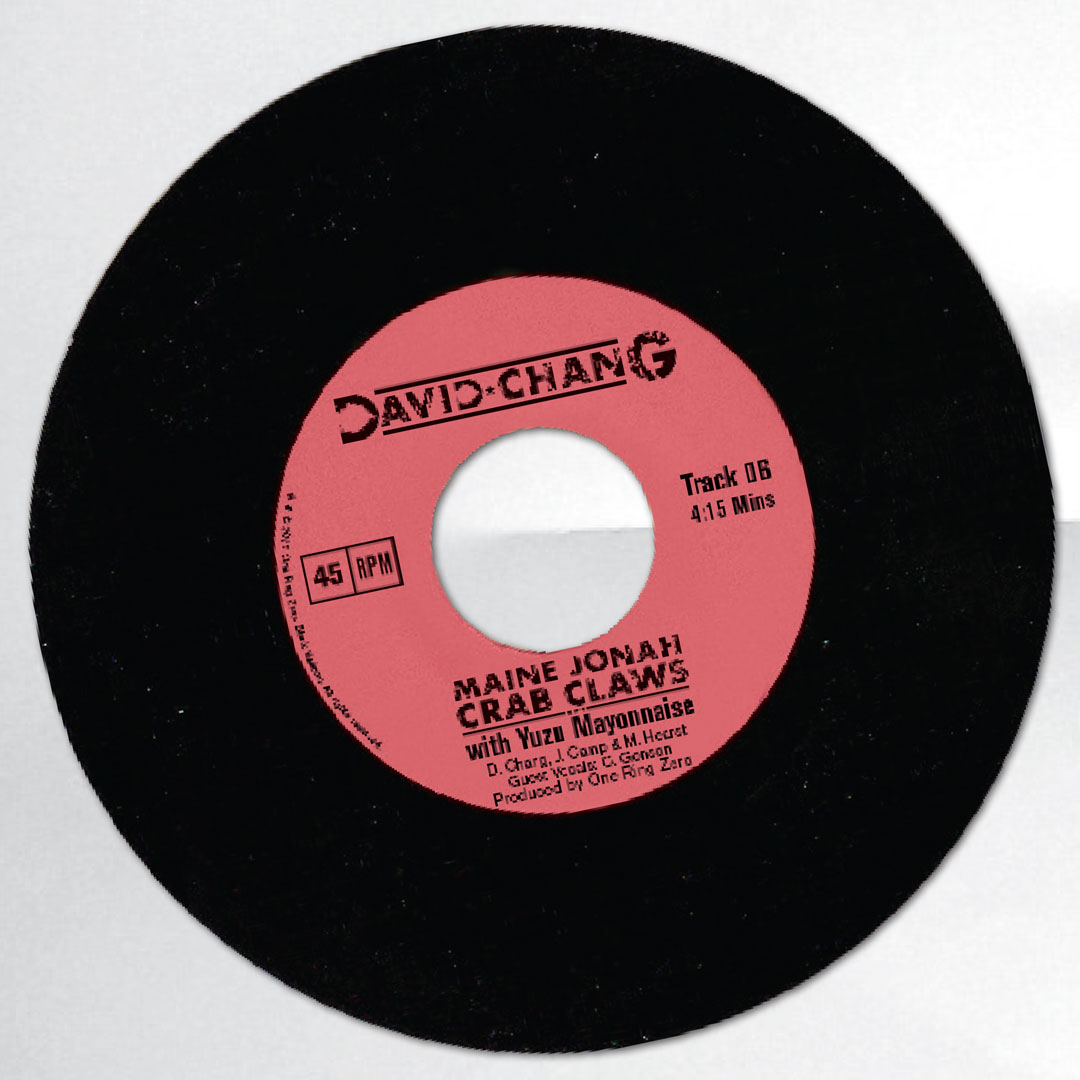
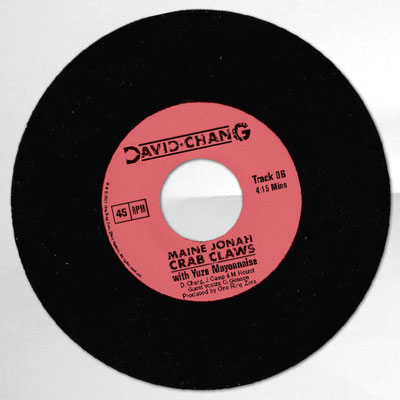
TRP: Would you say cooking requires artistry? Is it even an art? DC: It’s a mixture of craft and art. It can be an art depending on how pretentious you want it to be. That’s not the problem. It’s the entertainment side of the business that you want to watch out for. There’s a real distinction between an entertainer and a chef. I’ve said some terrible things about Guy Fieri (from Minute to Win It, on NBC). I said I’d throw him down the stairs and kill him. I said I’d throw him down again to make sure. My oldest brother was like, “How can you make fun of Guy Fieri? He wears a wristband in honor of his son.” And I was like, “If it really mattered that much to him, he wouldn’t fucking tell anybody! It’d be just between him and his son.” (Laughs)
This whole thing is a marketing ploy. Is it great for food? No, I don’t think so. Then again, people do what they have to do. Take Rachael Ray. Rachael Ray busts her ass. She never proclaimed she was a chef, not once. She said that she just sort of stumbled into it. People wanna hate on her because she’s massive—I used to be one of them. But Rachael Ray is fucking nice. She’s driven. But nice. And I think our natural inclination is just to hate on people that are extraordinarily successful.
TRP: So many chefs are getting their shows on the Food Network. Are you saying the rock-star chef motif is incompatible with good cooking?
DC: Basically, it’s the fame question, it’s something I struggle with, because, I’ve been fortunate to have a lot of opportunities to do TV. I’ve done it when necessary. If you’re on TV, it’s your restaurant and your seats and you need asses in every seat. At the end of the day your restaurant’s a business, at least in America.
Then again, I have a certain criteria about TV. And I feel like, if that criteria were met and I had the control to do it, then I’ll probably do it. The first thing would be, is the show educational? Is it in the pursuit of knowledge? And the second, does it represent the restaurant in a good light? Not only a good light but an honest one. And the last one, does it benefit research and development of new food ideas?
The emergence of the rock-star chef is a recent thing. If you’re a good musician, if you’re an athlete, if you’re 5’ 11” and 110 pounds and beautiful, you’re gonna be a model, you sort of know in the history of culture what’s going to happen. It’s already been laid out a little bit. Before 2004, before the emergence of Top Chef, nobody knew anything. The most you hoped for was maybe your own restaurant. And then all of a sudden—you’re going to be rich and famous? It changed the entire equation. It’s gotten weird.
Cooking is no longer about cooking now. It’s about trying to be famous. Or, even if you don’t want to be famous, you know that that possibility exists. For cooks starting out, it’s in their minds. Luckily, I started cooking before that really hit.
TRP: If you went out to see a band and had a few beers—okay 10 beers, what do you want to eat on the stumble home?
DC: My guilty drunken pleasure is chicken fingers. There’s something about the fried chicken finger. We’re serving fried chicken at Noodle Bar—whole, no fingers. It was born out of a contest between Peter Serpico (the chef at Ko) and myself, about who could create the crispiest chicken. We both were just talking mad shit to each other. I was like, “This chicken is gonna break your fuckin’ teeth . . .”
I made a Korean fried chicken—crazy popular all over Asia and America right now. It’s a triple-fried bird, it’s so crispy and spicy. Peter grew up in the Baltimore area, so he coated his in Old Bay seasoning. Anyway, we started this contest. A chicken-off. It took a couple months. And I think it ended a tie. I never wanna fry another bird in my life.
TRP: Have you ever considered cooking way, way, way outside your comfort zone? Like with something containing no fat?
DC: Fat-free, no. But seven or eight years ago, we would never be cooking sous vide or using hydrocolloids—which basically is a fancy word for shit that thickens food. Back then, I was like, “That’s not cooking!” Not only that but, if someone told me to add xanthan gum to a sauce, I’d be like, “No way.” Or if they told me to measure it in grams and said, “Here’s a gem scale,” I’d be like, “I’ve seen gem scales before, they’re not for fucking food.”
And now I’m like, “Oh, this is a superior way to cook certain things.” I think it’s a great way to cook fish. I think it’s a great way to cook some rice and meat, a great way to cook vegetables, make tofu, it’s endless.
Because I realized it’s all about the science. Sous vide helps you to have a better understanding of the cooking process. That’s how I realized how ignorant I was. I had no idea why a steak gets brown, or burned for that matter—I cheated my way through chemistry and biology, and, well, high school. I don’t know anything. I didn’t learn anything. I know there’s molecules and atoms and shit like that but . . .
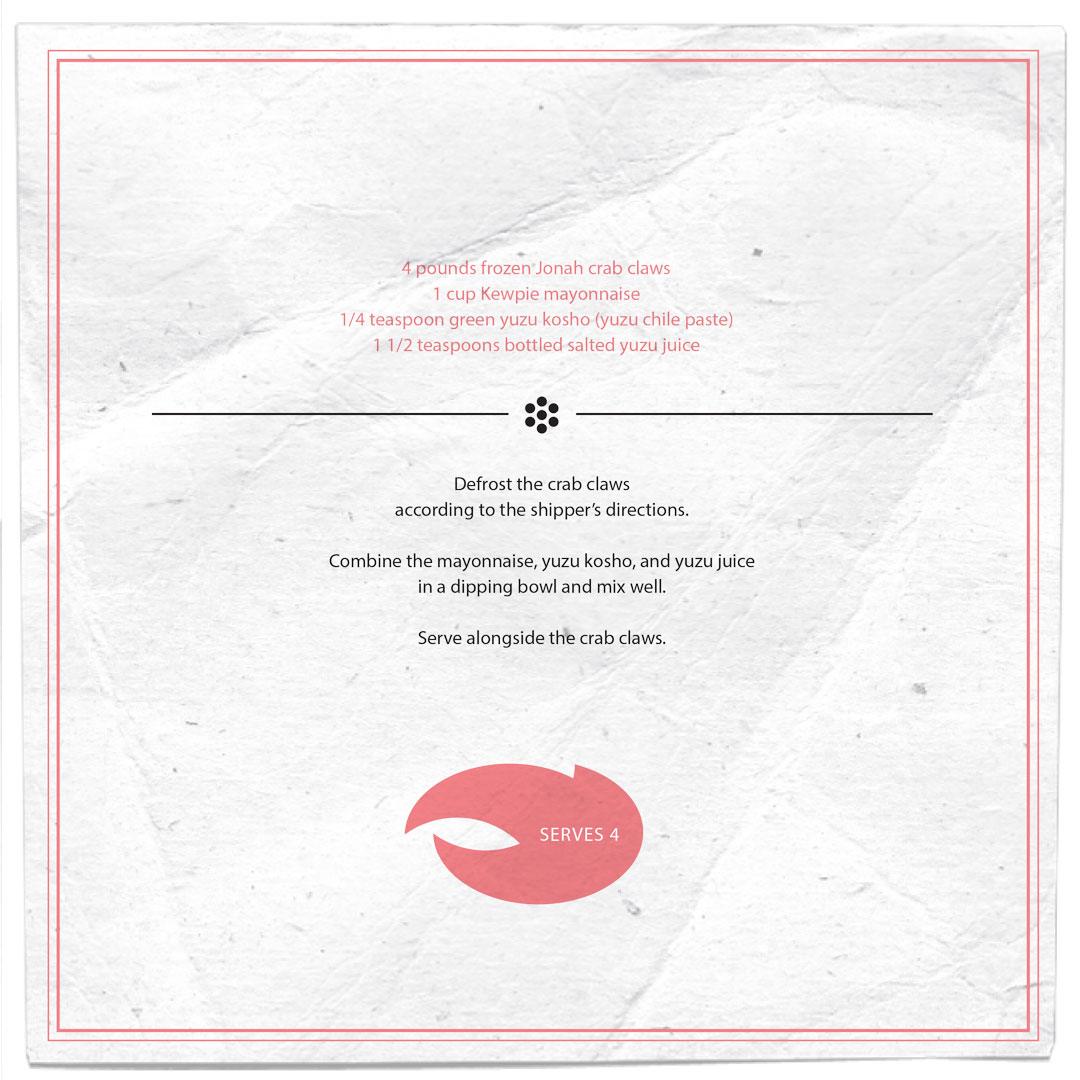
LN: But what about more traditional techniques? Didn’t you go to the French Culinary Institute?
DC: Old school cooking! It’s got this manly thing. Cooking today has become much more gentle, much more finesse-oriented. And that can be misconstrued as not cooking. There’s a lot of backlash against modern cooking, attacking stuff that Ferran Adrià or even Wiley Dufresne does, for instance. You can easily say, “That’s just garbage. They call it, whatever, molecular gastronomy. It’s a made-up name! It’s fucking bullshit!”
But like Harold McGee said, gastronomy encompasses everything. I told everyone in my kitchens to make a concerted effort to understand things, even if we don’t like them.
To go on a tangent, I remember when Gregg Allman was like, “This whole rap thing sucks! Rappers aren’t musicians. They don’t know how to play music. It’s awful.” Lo and behold they are musicians! Just in a completely different form. And with food over the past decade, it’s been a slow process of learning more about the stuff that—even if I’d previously said, “I don’t like that type of cuisine, I don’t like that method of cooking”—I have to immerse myself in it, so I understand it. So if I’m going to criticize it, I’m at least knowledgeable about it.
TRP: Do you cook for girls?
DC: I have cooked for a girlfriend. When she was sick. Chicken soup. That kind of thing.
TRP: Did you check out her CD collection before you did it?
DC: Yeah. Kind of. Like one woman turned to me and said, “I need to see Lady Gaga.” And I was like, “Ohhhhhh no . . .” What’s that fucking TV show? Desperate Housewives? I dated this girl and normally— if it hadn’t been that she was extraordinarily good-looking—there would have been all these red flags. But in my head I just kept thinking, it’s going to be okay, it’s going to be okay. And then, it just all built up—the bad music, the bad TV. And books too, it’s like, “What? You’re reading what? John Grisham!? What the fuck??”
TRP: I read that you are trademarking some of your really famous recipes like cereal milk? DC: We did that for our pastry chef, because I thought that the recipe was original enough. You know people steal ideas all the time. And people have done that to us. We’ve seen photos of it. If we were walking through the grocery store and we saw, like, cereal milk by fucking Nestlé, I would’ve shot myself in the face, I would’ve been like, fuck me! So that’s the main reason we did it, so we wouldn’t kill ourselves.
TRP: Copyright protection doesn’t do enough anymore, does it? For musicians or chefs. If they changed one word of your recipe, if I made, like, Rice Krispie milk, could you pursue me?
DC: The way I see it, in most cases, it’s going to be promotion. I didn’t understand when the Metallica guy Lars was like, “You can’t pirate our music!” I think the more people have access to music or a kind of food, the more they’re gonna crave it and gonna want it and they’re gonna actually buy the CD or go to the restaurant. That’s perfect for us. That’s great marketing.
TRP: Do you play any instruments?
DC: As a kid, I played violin and trumpet and clarinet all at the same time. Terrible. Elementary, junior high stuff. My mom would never let me play guitar. That’s all I wanted to play. Now I just wish I played the piano. It’s actually useful. There’s always a piano at like a wedding or a bar that nobody can fuckin’ play . . . I can’t even read music anymore.
TRP: Is there a musician you’ve never met that you always wanted to meet?
DC: I haven’t met them but I’ve cooked for them. David Bowie—can I tell ya how cool he is? So fucking cool. And his wife. I mean, he is a very good-looking man. This guy was built to be a superstar. And Iman is just the most gorgeous woman. They’re just radiating super- star shit. Crazy thing, I was at Craft and I was cooking for them, and Lou Reed’s sitting at another table, and they didn’t talk to each other! It was weird. But I would say the one guy who gave hope to every guy in the world is Ric Ocasek. I wanna hang out with Ric Ocasek, with or without the rest of the Cars.
TRP: Do you ever wanna do any- thing else besides be a chef? Like be in a band?
DC: I want to fly-fish. Fly fishing is playing chess with nature.
TRP: Why is there ice in your urinals?
DC: So when you piss it doesn’t splash. Because it’s stainless steel, without it, the pee goes all over.
TRP: It’s also kinda fun to watch the ice melt.
DC: Exactly. That’s the main reason. I think it’s one of the weird pleasures of being a guy is to watch ice melt, or snow melt, when you piss on it.
TRP: Do they put it in every morning?
DC: Every day, before service.
TRP: Do you have time to cook for yourself?
DC: I never cook for myself.
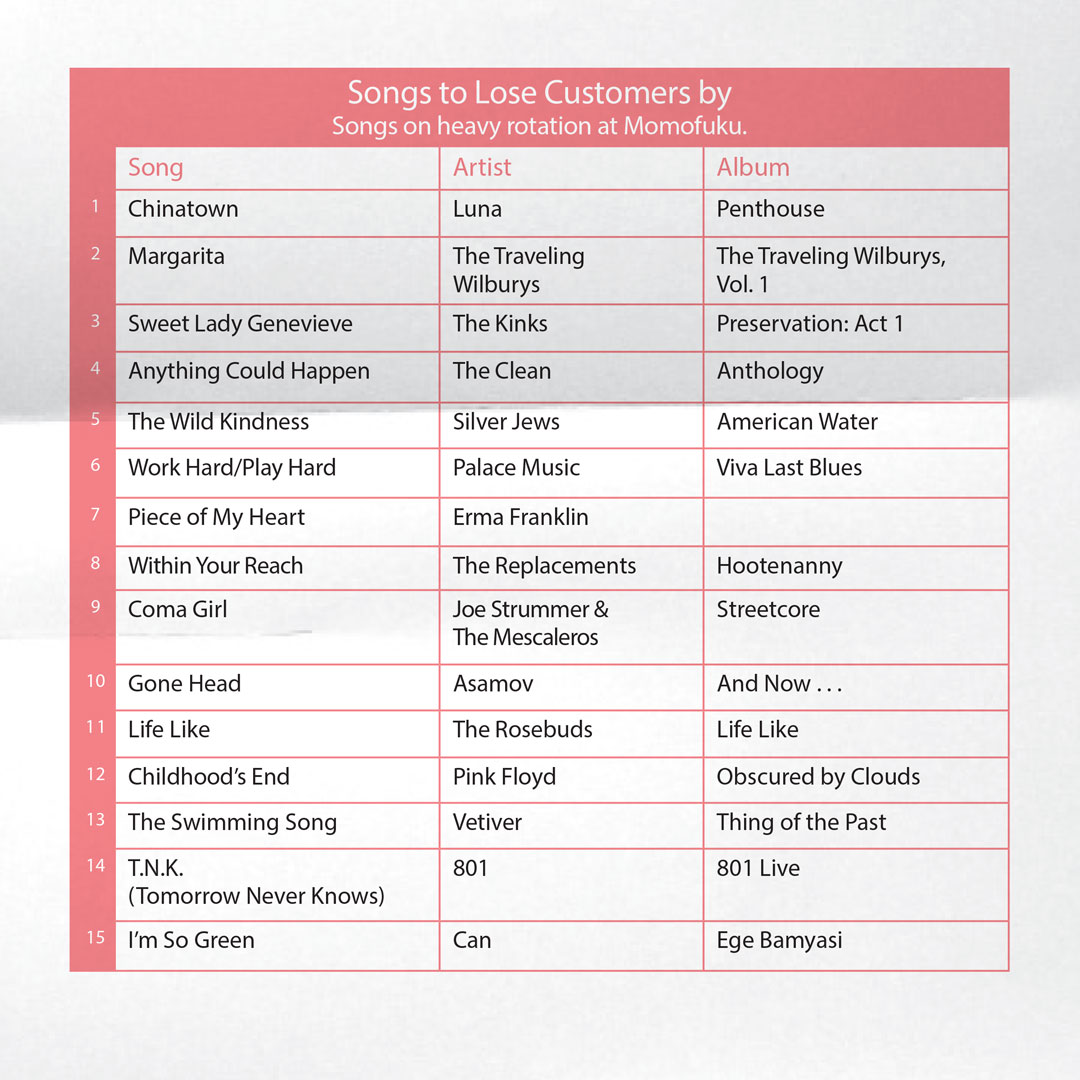
Michael Hearst is a composer, multi-instrumentalist, and writer. He is a founding member of the band One Ring Zero, which has released nine albums, including the literary collaboration As Smart As We Are (The Author Project), featuring lyrics by Paul Auster, Margaret Atwood, Dave Eggers, and Neil Gaiman, among others, and Planets, a collection of new compositions to represent the solar system and beyond.